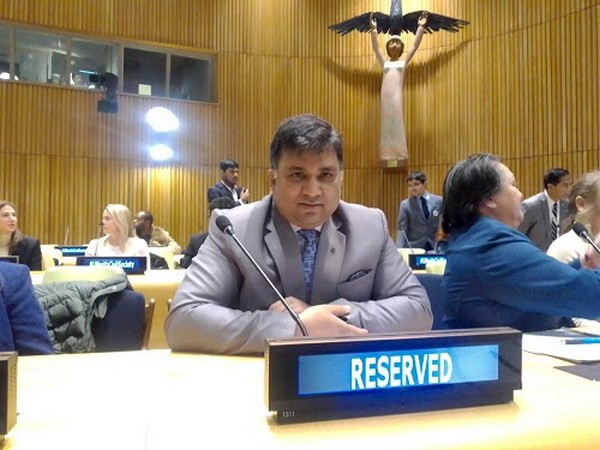United Nations: CNRI Calls for Framework of Collaborative Governance


New York [US], December 3 (ANI/NewsVoir): India’s leading non-governmental organisation Confederation of NGOs of Rural India (CNRI) at a UN conference made a strong case for developing a global framework of collaborative governance to resolve the global crisis and promote green technologies.
Speaking at Town Hall Meeting with the President of the General Assembly Csaba Korosi with Civil Society here, Secretary General of CNRI, Binod Anand said, it is essential to promote clean energy technologies and energy efficiency solutions.
Anand emphasised that energy efficiency and net zero energy systems will contribute to an affordable, clean, and sustainable future for all.
“We need a framework that prevents harmful chemicals from entering the environment and moves nations and businesses towards effective, safe, and green alternatives,” he said at the UN Conference.
He said that in an era of collaborative governance, cooperation was the key to deal with issues of global significance.
“The Global Challenges are transnational in nature and trans institutional in solution. They cannot be addressed by any government or institution acting alone. They require collaborative action among governments, international organizations, corporations, universities, NGOs, and creative individuals,” he said.
On behalf of United Nations Department of Global Communications, Anand was selected to deliver statement on ‘Solutions through science’.
Anand also cited the example of India’s leading cooperative organization, IFFCO and said it has created a revolution by use of Nanotechnology through a product NANO-UREA.
“It not only saves drudgery of farmers but at the same time eliminates NO2 and ammonia emissions. It has potential to help in meeting the UN Sustainable Goals and help in achieving the objectives of Paris Climate Agreement of limiting Global Warming,” he informed the gathering.
Anand also spoke at length about the scientific and spiritual achievements of ancient India recalling the contribution of Indian seers to the world of science.
Describing India as the Land of Innovations, Discoveries, Spirituality and Wonders, Anand said, “The best of the scientific solution suggested through treatise Bhagavad Gita has been the universal science of the soul which talks about address all challenges through reconstruction and talks happiness is the end of all our actions.”
“The science that compels us to embrace divinity and divine qualities. All other bodies of knowledge are subject to change, but this body of knowledge contained is timeless – eternal. Yogis through ‘Chittashuddhi’ (Eternal Purity) has taught us to achieve a deep meditative state, sense of eternity and happiness.”
The ancient Indian wisdom and scientific achievements, he added, has helped the world measure the Speed of Light, distance between Sun and earth about the source of the light of Moon, Gravity, and gravitation, about centripetal forces, telegraphy. Through Budhyan theories of Maths to Aryabhatt we have learnt to go beyond all limitations, Brahmagupta theory of finding Zero, planetary positions, he added.
The Mathematical contributions gifted by the Ancient Rishis to the world include Zero, Algebra, Trigonometry, Decimal system and Quadratic formula, Fibonacci Numbers, Length, Weights, Geometry, Infinite Series, BinaryCode, Chakravala The Method Of Algorithm and Encoding, he added.
“With 4 vedas, 18 Purana, Tantras and various writings of our ancestors we have explored the scientific solutions of all the current challenges the globe is facing today. Our ancestor Chanyaka had written volumes on what we study and practice today as Economics Diplomacy and in Foreign Policy. We have learnt to live with Nature through Acharya Sushruta, and Atomic Theory of Maharshi Kanad,” Anand said.
On behalf of United Nations Department of Global Communications, Anand was selected to deliver his statement on ‘Solutions through science’.
Established in 2005, Confederation of NGOs of Rural India or CNRI is the largest platform of NGOs in India as well as in the world. Currently it has over 7000 NGOs members and operates 29 State chapters and 634 District chapters spread across the country. CNRI has been continuously working for Rural Development and implementation of MNREGA and other flagship schemes of Govt. of India at various levels with an aim to make Indian agriculture resurgent and vibrant as well as doubling farmers’ Income.
This story has been provided by NewsVoir. ANI will not be responsible in any way for the content of this article. (ANI/NewsVoir)



